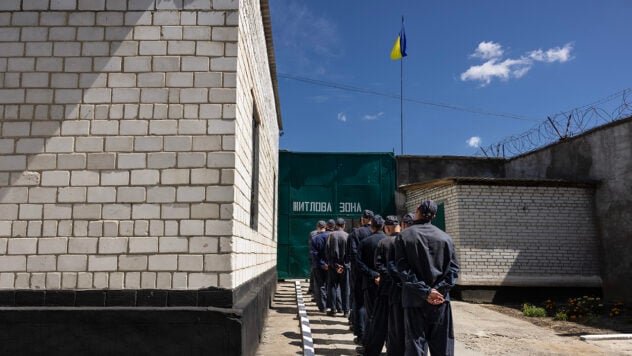
Ukraine is “re-educating” Russian prisoners of war who are in a camp specially designated for them.
This is reported by The Times, whose journalists visited the place where the occupiers were being held.
The material notes that captured Russians, many of whom are former prisoners, are “deprogrammed” during preparation for repatriation (return) to the Russian Federation.
Currently watching
The Times gives the story of 39-year-old Nikolai from Primorsk. In July, he went to war against Ukraine, believing that Russians and Ukrainians are supposedly one people who are divided by NATO.
“I grew up in the Soviet Union, so I feel like we are one country,” he told reporters, sitting in the infirmary of a prisoner of war camp, where he is being treated after a bullet wound to his arm.
Today Nikolai, like other occupying prisoners of war, wakes up in the camp at 6:00 am to the sounds of the Ukrainian national anthem playing from the loudspeaker.
To get from the living quarters to the dining room, Russians must walk along an alley lined with photographs of figures from Ukraine's past. Among them are portraits of Stepan Bandera and Taras Shevchenko.
After breakfast, Russians should observe a minute of silence for the Ukrainians killed as a result of the Russian invasion.
Want to rest? Come to Facti.GAMES!
The prisoners of war are given a kind of crash course in Ukrainian history to refute Russian dictator Vladimir Putin's assertion that Ukraine is not an independent state.
As noted in the camp for Russian prisoners of war, the occupiers may not like it, but it will benefit them. They are trying to eradicate neo-imperialist ideology among Russians before they return home.
– Russians have been subjected to propaganda all their lives. “It’s like trying to get someone out of a religious sect… This is a crash course in the history of Ukraine that we give to prisoners to debunk Putin’s statements that Ukraine is not an independent state,” said Petr Yatsenko, speaker of the Ukrainian Coordination Committee, in a comment to The Times. headquarters for the treatment of prisoners of war.
Symbolic of how most Russian prisoners of war perceive Ukraine, he said, was one new arrival who looked at a portrait of Bandera and thought it was a photo of a young Putin.
Yatsenko also reported that some occupiers who had previously been imprisoned in the Russian Federation tried to introduce a “criminal order” in the camp, based on the traditions of the Russian prison hierarchy. In this way they wanted to demonstrate that they were “big people” here. However, these attempts are quickly abandoned.
“We stop this very quickly.” We tell them that if you behave badly, we will release you and let the Ukrainians deal with you. It usually works,” he said.
The camp for Russian prisoners of war, which the journalists visited, is the largest in Ukraine. There, the occupiers are waiting to be sent home as part of a prisoner exchange or after the end of the war.
According to the Geneva Conventions, they work six days a week and are paid $8 per month. Prisoners of war spend these funds on drinks and sweets in a store on the camp territory.
As you know, due to the large number of Russian prisoners of war in Ukraine, they are planning to open a new camp to hold them. The government hopes to receive funds for this from international partners. Although “several million hryvnia” will most likely have to be allocated from the Ukrainian budget.

